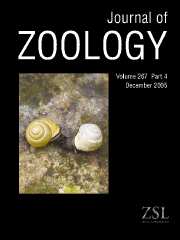Crossref Citations
This article has been cited by the following publications. This list is generated based on data provided by
Crossref.
Kenward, R.E.
Hodder, K.H.
Rose, R.J.
Walls, C.A.
Parish, T.
Holm, J.L.
Morris, P.A.
Walls, S.S.
and
Doyle, F.I.
1998.
Comparative demography of red squirrels (Sciurus vulgaris) and grey squirrels (Sciurus carolinensis) in deciduous and conifer woodland.
Journal of Zoology,
Vol. 244,
Issue. 1,
p.
7.
Bryce, Jenny
Johnson, Paul J.
and
Macdonald, David W.
2002.
Can niche use in red and grey squirrels offer clues for their apparent coexistence?.
Journal of Applied Ecology,
Vol. 39,
Issue. 6,
p.
875.
Banks, Peter B
Norrdahl, Kai
and
Korpimäki, Erkki
2002.
Mobility decisions and the predation risks of reintroduction.
Biological Conservation,
Vol. 103,
Issue. 2,
p.
133.
Mason, G
and
Littin, K E
2003.
The Humaneness of Rodent Pest Control.
Animal Welfare,
Vol. 12,
Issue. 1,
p.
1.
Tompkins, D. M.
White, A. R.
and
Boots, M.
2003.
Ecological replacement of native red squirrels by invasive greys driven by disease.
Ecology Letters,
Vol. 6,
Issue. 3,
p.
189.
Millspaugh, Joshua J.
Gitzen, Robert A.
Kernohan, Brian J.
Larson, Michael A.
and
Clay, Christopher L.
2004.
Comparability of three analytical techniques to assess joint space use.
Wildlife Society Bulletin,
Vol. 32,
Issue. 1,
p.
148.
GURNELL, J.
LURZ, P. W. W.
SHIRLEY, M. D. F.
CARTMEL, S.
GARSON, P. J.
MAGRIS, L.
and
STEELE, J.
2004.
Monitoring red squirrelsSciurus vulgarisand grey squirrelsSciurus carolinensisin Britain.
Mammal Review,
Vol. 34,
Issue. 1-2,
p.
51.
Wauters, Luc A.
Zaninetti, Massimiliano
Tosi, Guido
and
Bertolino, Sandro
2004.
Is coat-colour polymorphism in Eurasian red squirrels (Sciurus vulgaris L.) adaptive?.
mamm,
Vol. 68,
Issue. 1,
p.
37.
FRAIR, JACQUELINE L.
MERRILL, EVELYN H.
ALLEN, JAMES R.
and
BOYCE, MARK S.
2007.
Know Thy Enemy: Experience Affects Elk Translocation Success in Risky Landscapes.
The Journal of Wildlife Management,
Vol. 71,
Issue. 2,
p.
541.
Stamps, Judy A.
and
Swaisgood, Ronald R.
2007.
Someplace like home: Experience, habitat selection and conservation biology.
Applied Animal Behaviour Science,
Vol. 102,
Issue. 3-4,
p.
392.
Sainsbury, Anthony W.
2008.
Zoo and Wild Animal Medicine.
p.
236.
Knight, Carolyn M.
Kenward, Robert E.
Gozlan, Rodolphe E.
Hodder, Kathryn H.
Walls, Sean S.
and
Lucas, Martyn C.
2009.
Home-range estimation within complex restricted environments: importance of method selection in detecting seasonal change.
Wildlife Research,
Vol. 36,
Issue. 3,
p.
213.
Finnegan, Laura A.
Poole, Alan
Lawton, Colin
and
Rochford, John M.
2009.
Morphological diversity of the red squirrel, Sciurus vulgaris, in Ireland.
European Journal of Wildlife Research,
Vol. 55,
Issue. 2,
p.
145.
Poole, Alan
and
Lawton, Colin
2009.
The translocation and post release settlement of red squirrels Sciurus vulgaris to a previously uninhabited woodland.
Biodiversity and Conservation,
Vol. 18,
Issue. 12,
CARROLL, B.
RUSSELL, P.
GURNELL, J.
NETTLETON, P.
and
SAINSBURY, A. W.
2009.
Epidemics of squirrelpox virus disease in red squirrels (Sciurus vulgaris): temporal and serological findings.
Epidemiology and Infection,
Vol. 137,
Issue. 2,
p.
257.
Knowlton, Jessie L.
and
Graham, Catherine H.
2010.
Using behavioral landscape ecology to predict species’ responses to land-use and climate change.
Biological Conservation,
Vol. 143,
Issue. 6,
p.
1342.
Roe, John H.
Frank, Michael R.
Gibson, Scott E.
Attum, Omar
and
Kingsbury, Bruce A.
2010.
No place like home: an experimental comparison of reintroduction strategies using snakes.
Journal of Applied Ecology,
Vol. 47,
Issue. 6,
p.
1253.
LaRose, J. P.
Meredith, A. L.
Everest, D. J.
Fiegna, C.
McInnes, C. J.
Shaw, D. J.
and
Milne, E. M.
2010.
Epidemiological and postmortem findings in 262 red squirrels (Sciurus vulgaris) in Scotland, 2005 to 2009.
Veterinary Record,
Vol. 167,
Issue. 8,
p.
297.
Yeates, James
2010.
What can pest management learn from laboratory animal ethics?.
Pest Management Science,
Vol. 66,
Issue. 3,
p.
231.
Swaisgood, RR
2010.
The conservation-welfare nexus in reintroduction programmes: a role for sensory ecology.
Animal Welfare,
Vol. 19,
Issue. 2,
p.
125.


